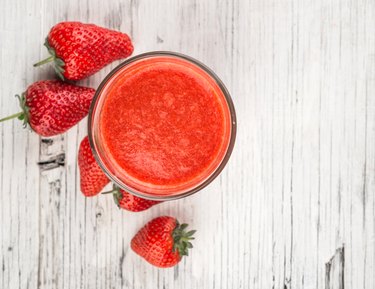
Planning a seven-day liquid diet depends on what type of liquid diet you're on and why. People on a liquid diet for medical reasons, such as an upcoming surgery or an intestinal illness, may have different restrictions than someone on a liquid diet for weight loss purposes, for example.
People on a liquid diet should be under the supervision of a doctor to make sure they get sufficient nutrients. Talk to your physician for a personalized meal plan.
Video of the Day
Video of the Day
Clear Liquid vs. Full Liquid
Depending on the reason for eating only liquids, you may have to follow a clear liquid or a full liquid diet. According to Stanford University Medical Center, a clear liquid diet includes foods that are liquid at room temperature, or foods you are able to see through. A clear liquid diet should not be followed for more than three to five days and under medical supervision.
A full liquid diet is less restrictive and includes all of the foods on the clear liquid diet, plus foods that are creamed, pureed and milk-based.
Breakfast Options
On a clear liquid diet, you can start your morning off with fruit juice without pulp. Nutritional drinks, such as Boost or Ensure, make products that are allowed for a clear liquid diet and are good for adding calories and protein. Tea and coffee, without milk or cream, are also allowed on this diet.
For a full liquid diet, depending on your doctor's orders, you may be able to eat cooked cereal like oatmeal or cream of wheat or rice, especially if you thin it down with extra milk. Milk and liquid nutritional supplements are also included on this diet.
You can add variety throughout your seven-day diet by rotating different types of juices and cereals. You can also have fruit smoothies made with yogurt and pureed skinless and seedless fruits, or some kefir, which is a type of drinkable yogurt. If you need to add calories, include honey or maple syrup to sweeten your smoothie and cereal, and use a little melted butter on the cereal as well.
Lunch and Dinner
Clear broth or consommé are the main lunch and dinner choices for a clear liquid diet. Clear gelatin, sports drinks, and plain ice pops are also appropriate choices for meals.
On a full liquid diet, pureed soup is a good choice for lunch and dinner. You can make your own or use an already prepared soup. If you puree it yourself, you may need to strain it to catch any chunks. You can increase your protein intake by adding skim milk powder or protein powder to the liquids or using a meal replacement drink. Serve your soup with tea, milk or a glass of vegetable juice.
Desserts and Snacks
You'll only be able to eat so much liquid food at one time, so have snacks as well as meals, especially if you aren't trying to lose weight. Milkshakes, gelatin with whipped cream, pudding, sherbet, ice creams without any chunky add-ins, fruit juice bars, and custard-style yogurt are all allowed on a liquid diet.
Potential Considerations
Diet statistics show liquid diets for weight-loss may be very low in calories, typically containing 800 calories or less per day. This type of diet needs medical supervision or you could wind up not getting enough essential nutrients. While they can lead to rapid weight loss, people often have a hard time maintaining that weight loss once they go back to eating regular foods.
Some people also have difficulty switching back to regular foods and come to rely on liquid meal-replacement drinks, which isn't particularly healthy. When the time is appropriate to start adding more solid foods in the diet, take your time and slowly add in solid foods to avoid gastrointestinal issues. Consult with a registered dietitian for help.
If you're lactose-intolerant, avoid regular dairy products during your full liquid diet or take a lactase supplement before eating dairy to avoid undesirable gastrointestinal side effects.
Check with your doctor or a registered dietitian nutritionist to make sure your diet includes all the nutrients you need and that it won't interfere with any health conditions you may have, such as kidney disease, diabetes, heart disease, high blood pressure, or swallowing difficulties. You may need to take supplements, especially if you're on a liquid diet for more than five days.
- MedlinePlus: Diet - Full Liquid
- Drugs.com: Full Liquid Diet
- Jackson Siegelbaum Gastroenterology: Full Liquid Diet
- University of Pittsburgh Medical Center: Full Liquid Diet
- Nutrition Diva: Healthy Options for Soft or Liquid Diets
- The New York Times: The Grip Of the Liquid Diet: A special report: Dieters, Craving Balance, Are Battling Fears of Food